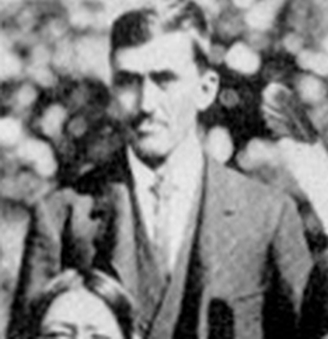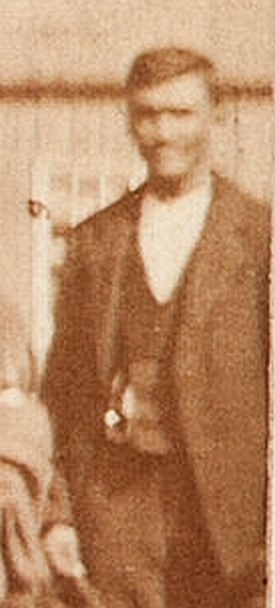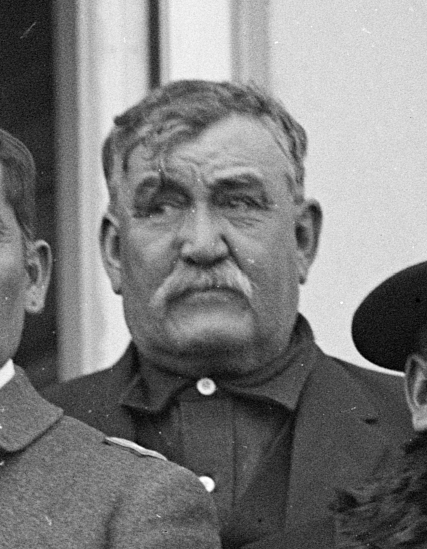Post by ephriam on Jun 22, 2014 17:20:26 GMT -5
In the Meany interviews, there is a great detailed visit with Charles C. Tackett, interpreter on the Rosebud Reservation and a grandson of Pierre Dorion of Lewis and Clark fame. Tackett's interview includes a new account of the fight on Horse Creek in June 1865 in which Capt. Fouts was killed. Tackett, just eleven years old at the time, was with his family, including his step-father Charles Elliston. Enjoy!
[The Tackett family remained at Fort Laramie] until the spring 1865 when two Sioux “Blackfeet” and “Two Face” and one Cheyenne “Long Wolf” were hanged for turning over a captured white woman who reported she and her child had been mistreated. By this time the mother had married Charles Elston a guide and interpreter for the military. The Indians had brought their prisoners to Elston’s tipi because he was in charge of the Indian scouts. He took them to the white officers. After this hanging, war feelings were aroused in the Indians. In this outfit were White Wash, Thunder Bear, Dress and Shabby who were put in irons.
Eight hundred or more lodges including the bands of Spotted Tail, Big Mouth, Standing Elk, Iron Shell, Swift Bear, Little Thunder, White Thunder and part of Red Cloud’s band and nearly all the squaw men and mixed bloods, were all ordered to be at Kearney. The intention was to send troops north to pursue the bands of Red Cloud, Sitting Bull and others.
After the third day of Fort Laramie, at Two-Horse Creek, they camped at noon. Little Thunder camped to one side, the others going into one camp. Two hundred soldiers were guarding them to Kearney. In the afternoon Captain Foutz saw Little Thunder to one side and called Elston over to the soldiers’ camp and Tackett went along This was in 1865. The captain said:
“Elston, I want you to tell Little Thunder to move near by. If he don’t, I’ll thumb him and trot him behind a six-mule team all day tomorrow.”
They were then about 15 miles from Fort Mitchell where there were more troops.
The Indians had killed some antelope and were holding a “dog soldier” feast and Tackett and Elston went over to it. Elston gave the message of Captain Foutz to Little Thunder. Over a hundred warriors in a circle heard this message and one of the Indians spoke up to Elston:
“It is a pity you are not that officer for I would fill you full of arrows right away.”
It was afterward learned that this very council had been called to devise ways of crossing the Platte which was ten booming and to thus elude the soldiers.
Elston and Tackett then went home to their own camp.
That evening at dusk there came to Elston: Big Mouth, Swift Bear and Standing Elk. They said there would be an outbreak in the morning. Before sun-up the camp was astir. Elston hitched up the team for the mother, saddled his horse and Tackett saddled his pony. As this was going on Captain Foutz arrived in the camp and said:
“Elston come along with me. I am going to see Little Thunder and make him come to time.”
He was all alone on a big stallion and had two big horse pistols on his saddle.
Elston said: “Captain, go on. I’ll be there in a minute.”
Captain Foutz said: “Hurry up or I’ll put you under arrest.”
The old man said: “Just as quick as I drive this team across the creek for the old lady, I’ll be along.”
As he said that young Tackett started ahead towards the crossing. Reaching the crossing he saw the prisoners in irons standing partly in the water and near them was a six-mule team. The prisoners had permission to ride that day and their wives were bringing up horses as young Tackett passed by.
He heard Shabby say to his wife: “I am all crippled up and cannot ride. It does not matter what happens to me. You take my horse back.”
Tackett went on to where the boys were herding the horses and cattle. Tackett headed that way to get the family stock, about 25 head of horses. Just as he reached the cattle he heard shooting going on at the camp. The captain was killed as he entered the main camp. The whole camp was in a hubbub. The Indians pulled for the river. The herders had left, the mixed bloods for the wagon train and the Indian boys for the Indian camp.
Tackett and Antoine and John Redeaux were trying to cut their horses out of the herd. Tackett heard a call in Indian addressed to him: “Go if you want to live.”
He saw 8 horsemen, Indians, one of whom shook his bow at the boy who took his advice and pulled for the troops and came upon them as they arrived at Kiowa Creek crossing and between him were seven Indians, including White Wash, White Yellow Fox, Dress, and Thunder Bear, the son of Blackfeet who was hanged. These Indians still had the balls and chains on as prisoners and yet with three others they were chasing the soldiers and shooting arrows into them. Their hands were not manacled. Tackett passed around to the left toward the wagon train. He saw the whole fight. The train of 50 or 60 wagons in a corral leaving an open space. Tackett passed in and behind him followed the soldiers like a lot of cattle driven by the Indians. As the yelling Indians turned Louis Bordeaux shot at one. It was the only shot Tackett saw the soldier-side fire up to that time though they had been shooting with pistols. The big American horses had been scared by the noise and rattle of the Indians.
Mrs. Foutz cried out, referring to Shabby who was crippled and in irons: “Take that Indian out and kill him.”
Moonlight was in command after the death of Foutz.
They took Shabby out of the wagon and he yelled out: “I am a man and can stand punishment.” He hopped out on one leg onto the prairie about 20 yards and about 20 soldiers fired at him and killed him. Old Leo Pollidy, a scout, went out and scalped Shabby.
Two companies of troops counter charged but were driven back to the corral.
It was then learned that besides Captain Foutz, the sergeant and three privates had died at the first crossing. The sergeant was a brave man. He fired all of his ammunition and then took after the Indians with his sabre until he was cut down.
As Tackett passed the troops in the flight he saw a soldier shot in the shoulder by an arrow. As he turned he got another in the temple and rode into the corral with two arrows dangling. The one from the shoulder was pulled easily but when the one in the head was pulled out the soldier dropped dead.
Shabby was the only Indian killed, while White Thunder’s brother was wounded in the heel. Though the Platte was bank high with water, the Indians all swam across and saved their horses and cattle. They left their tipis as they stood in the camp. They captured all the horses and cattle of the troops and mixed bloods.
That same day they brought in the dead bodies and moved a couple of miles down the river. Before leaving they took some of the Indian property in the deserted camp and burned the balance.
Reinforcements arrived and with them came Good Voice as Sioux scout, also Coarse Voice.
Elston and the troops tried to cross the river to pursue the Indians but failed. The Indians fled over the sand hills toward the north.
They buried the sergeant and privates on the field but carried the body of Captain Foutz to Fort Mitchell where he was buried the next day.
Two days later they started, taking Good voice Coarse Voice their families the released captive woman who caused the trouble, the Tackett family, for Julesburg, Neb. On the way they met two regiments, one of infantry and one of cavalry and the next day another regiment of infantry. Twenty-five miles from Julesburg they found telegraphs destroyed by the Sioux and Cheyennes. Up and down the river at Julesburg were troops and emigrants camped on account of Indian scare.
[The Tackett family remained at Fort Laramie] until the spring 1865 when two Sioux “Blackfeet” and “Two Face” and one Cheyenne “Long Wolf” were hanged for turning over a captured white woman who reported she and her child had been mistreated. By this time the mother had married Charles Elston a guide and interpreter for the military. The Indians had brought their prisoners to Elston’s tipi because he was in charge of the Indian scouts. He took them to the white officers. After this hanging, war feelings were aroused in the Indians. In this outfit were White Wash, Thunder Bear, Dress and Shabby who were put in irons.
Eight hundred or more lodges including the bands of Spotted Tail, Big Mouth, Standing Elk, Iron Shell, Swift Bear, Little Thunder, White Thunder and part of Red Cloud’s band and nearly all the squaw men and mixed bloods, were all ordered to be at Kearney. The intention was to send troops north to pursue the bands of Red Cloud, Sitting Bull and others.
After the third day of Fort Laramie, at Two-Horse Creek, they camped at noon. Little Thunder camped to one side, the others going into one camp. Two hundred soldiers were guarding them to Kearney. In the afternoon Captain Foutz saw Little Thunder to one side and called Elston over to the soldiers’ camp and Tackett went along This was in 1865. The captain said:
“Elston, I want you to tell Little Thunder to move near by. If he don’t, I’ll thumb him and trot him behind a six-mule team all day tomorrow.”
They were then about 15 miles from Fort Mitchell where there were more troops.
The Indians had killed some antelope and were holding a “dog soldier” feast and Tackett and Elston went over to it. Elston gave the message of Captain Foutz to Little Thunder. Over a hundred warriors in a circle heard this message and one of the Indians spoke up to Elston:
“It is a pity you are not that officer for I would fill you full of arrows right away.”
It was afterward learned that this very council had been called to devise ways of crossing the Platte which was ten booming and to thus elude the soldiers.
Elston and Tackett then went home to their own camp.
That evening at dusk there came to Elston: Big Mouth, Swift Bear and Standing Elk. They said there would be an outbreak in the morning. Before sun-up the camp was astir. Elston hitched up the team for the mother, saddled his horse and Tackett saddled his pony. As this was going on Captain Foutz arrived in the camp and said:
“Elston come along with me. I am going to see Little Thunder and make him come to time.”
He was all alone on a big stallion and had two big horse pistols on his saddle.
Elston said: “Captain, go on. I’ll be there in a minute.”
Captain Foutz said: “Hurry up or I’ll put you under arrest.”
The old man said: “Just as quick as I drive this team across the creek for the old lady, I’ll be along.”
As he said that young Tackett started ahead towards the crossing. Reaching the crossing he saw the prisoners in irons standing partly in the water and near them was a six-mule team. The prisoners had permission to ride that day and their wives were bringing up horses as young Tackett passed by.
He heard Shabby say to his wife: “I am all crippled up and cannot ride. It does not matter what happens to me. You take my horse back.”
Tackett went on to where the boys were herding the horses and cattle. Tackett headed that way to get the family stock, about 25 head of horses. Just as he reached the cattle he heard shooting going on at the camp. The captain was killed as he entered the main camp. The whole camp was in a hubbub. The Indians pulled for the river. The herders had left, the mixed bloods for the wagon train and the Indian boys for the Indian camp.
Tackett and Antoine and John Redeaux were trying to cut their horses out of the herd. Tackett heard a call in Indian addressed to him: “Go if you want to live.”
He saw 8 horsemen, Indians, one of whom shook his bow at the boy who took his advice and pulled for the troops and came upon them as they arrived at Kiowa Creek crossing and between him were seven Indians, including White Wash, White Yellow Fox, Dress, and Thunder Bear, the son of Blackfeet who was hanged. These Indians still had the balls and chains on as prisoners and yet with three others they were chasing the soldiers and shooting arrows into them. Their hands were not manacled. Tackett passed around to the left toward the wagon train. He saw the whole fight. The train of 50 or 60 wagons in a corral leaving an open space. Tackett passed in and behind him followed the soldiers like a lot of cattle driven by the Indians. As the yelling Indians turned Louis Bordeaux shot at one. It was the only shot Tackett saw the soldier-side fire up to that time though they had been shooting with pistols. The big American horses had been scared by the noise and rattle of the Indians.
Mrs. Foutz cried out, referring to Shabby who was crippled and in irons: “Take that Indian out and kill him.”
Moonlight was in command after the death of Foutz.
They took Shabby out of the wagon and he yelled out: “I am a man and can stand punishment.” He hopped out on one leg onto the prairie about 20 yards and about 20 soldiers fired at him and killed him. Old Leo Pollidy, a scout, went out and scalped Shabby.
Two companies of troops counter charged but were driven back to the corral.
It was then learned that besides Captain Foutz, the sergeant and three privates had died at the first crossing. The sergeant was a brave man. He fired all of his ammunition and then took after the Indians with his sabre until he was cut down.
As Tackett passed the troops in the flight he saw a soldier shot in the shoulder by an arrow. As he turned he got another in the temple and rode into the corral with two arrows dangling. The one from the shoulder was pulled easily but when the one in the head was pulled out the soldier dropped dead.
Shabby was the only Indian killed, while White Thunder’s brother was wounded in the heel. Though the Platte was bank high with water, the Indians all swam across and saved their horses and cattle. They left their tipis as they stood in the camp. They captured all the horses and cattle of the troops and mixed bloods.
That same day they brought in the dead bodies and moved a couple of miles down the river. Before leaving they took some of the Indian property in the deserted camp and burned the balance.
Reinforcements arrived and with them came Good Voice as Sioux scout, also Coarse Voice.
Elston and the troops tried to cross the river to pursue the Indians but failed. The Indians fled over the sand hills toward the north.
They buried the sergeant and privates on the field but carried the body of Captain Foutz to Fort Mitchell where he was buried the next day.
Two days later they started, taking Good voice Coarse Voice their families the released captive woman who caused the trouble, the Tackett family, for Julesburg, Neb. On the way they met two regiments, one of infantry and one of cavalry and the next day another regiment of infantry. Twenty-five miles from Julesburg they found telegraphs destroyed by the Sioux and Cheyennes. Up and down the river at Julesburg were troops and emigrants camped on account of Indian scare.






